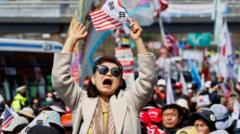As South Korea grapples with the political implications of Yoon's impeachment, the nation prepares for a snap election amidst a backdrop of division and unrest.
South Korea's President Yoon Suk Yeol Impeached: What Lies Ahead?

South Korea's President Yoon Suk Yeol Impeached: What Lies Ahead?
Following a unanimous decision by the Constitutional Court, South Korea faces a pivotal moment as Yoon Suk Yeol is removed from office.
In a historic ruling, South Korea's Constitutional Court has unanimously upheld the impeachment of President Yoon Suk Yeol, leading to his ouster from office. The decision came after months of political turmoil, beginning with Yoon's controversial attempt to impose martial law, which was swiftly overturned by parliament. The court's ruling on Friday was met with a mixed response from the public—joy for many who opposed Yoon's leadership and sorrow for his supporters, as crowds gathered across Seoul to witness the moment.
The ruling mandates that a snap election be held to select Yoon's successor by June 3, and it marks a significant turning point for a nation eager to restore stability. However, the ramifications of Yoon's brief military takeover, which lasted just six hours, reverberate through the political landscape of South Korea, raising fears of an authoritarian resurgence.
Yoon's actions on December 3, when he ordered military personnel to intervene in a parliamentary budget dispute, have left an indelible scar on the national psyche. The court, in its critique, stated that Yoon's power grab was unjustified and detrimental to the democratic principles of the country. Moon Hyung-bae, the acting president of the court's eight-member bench, emphasized that Yoon had betrayed the citizenry he was meant to serve.
Calls are growing for constitutional reforms to limit presidential powers and strengthen the nation's political institutions, a complex challenge that will require courage from future leaders. Presently, South Korea emerges from this crisis more polarized than ever. Following Yoon's departure, many citizens express growing distrust in the government and the electoral system, complicating the path to national reconciliation.
Yoon's refusal to accept accountability and his perpetuation of unsubstantiated claims against his political adversaries have fueled far-right sentiments and widespread protests. Despite the court's verdict, Yoon's base remains loyal, viewing him as a martyr in a battle against alleged corruption and foreign influence.
As South Korea prepares for the upcoming election, the urgency for a unifying leader is palpable. The nation must also contend with external pressures, including economic challenges posed by U.S. tariffs under President Trump, intensifying the need for a strategic and diplomatic approach in the embattled region.
Yoon's legal team has denounced the court's decision as politically motivated, signaling a continued struggle over legitimacy and authority in South Korean politics. Nevertheless, politicians are urging citizens to prioritize unity and acceptance of the ruling, recognizing that the country needs to move forward.
In his final remarks as president, Yoon expressed regret to his supporters without acknowledging the court ruling, highlighting his contentious relationship with the nation's governance structures. As South Korea strides into a new chapter marked by deep divides and urgent political challenges, the outcome of the imminent election is set to shape the future trajectory of democracy in the nation.
The ruling mandates that a snap election be held to select Yoon's successor by June 3, and it marks a significant turning point for a nation eager to restore stability. However, the ramifications of Yoon's brief military takeover, which lasted just six hours, reverberate through the political landscape of South Korea, raising fears of an authoritarian resurgence.
Yoon's actions on December 3, when he ordered military personnel to intervene in a parliamentary budget dispute, have left an indelible scar on the national psyche. The court, in its critique, stated that Yoon's power grab was unjustified and detrimental to the democratic principles of the country. Moon Hyung-bae, the acting president of the court's eight-member bench, emphasized that Yoon had betrayed the citizenry he was meant to serve.
Calls are growing for constitutional reforms to limit presidential powers and strengthen the nation's political institutions, a complex challenge that will require courage from future leaders. Presently, South Korea emerges from this crisis more polarized than ever. Following Yoon's departure, many citizens express growing distrust in the government and the electoral system, complicating the path to national reconciliation.
Yoon's refusal to accept accountability and his perpetuation of unsubstantiated claims against his political adversaries have fueled far-right sentiments and widespread protests. Despite the court's verdict, Yoon's base remains loyal, viewing him as a martyr in a battle against alleged corruption and foreign influence.
As South Korea prepares for the upcoming election, the urgency for a unifying leader is palpable. The nation must also contend with external pressures, including economic challenges posed by U.S. tariffs under President Trump, intensifying the need for a strategic and diplomatic approach in the embattled region.
Yoon's legal team has denounced the court's decision as politically motivated, signaling a continued struggle over legitimacy and authority in South Korean politics. Nevertheless, politicians are urging citizens to prioritize unity and acceptance of the ruling, recognizing that the country needs to move forward.
In his final remarks as president, Yoon expressed regret to his supporters without acknowledging the court ruling, highlighting his contentious relationship with the nation's governance structures. As South Korea strides into a new chapter marked by deep divides and urgent political challenges, the outcome of the imminent election is set to shape the future trajectory of democracy in the nation.



















